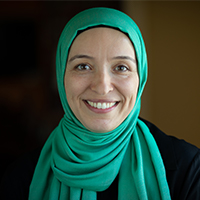Zeyneb Sayilgan, Ph.D.
Muslim Scholar

Zeyneb Sayilgan, Ph.D., is the Muslim Scholar at ICJS, where her research centers around Islamic theology and spirituality, Christian-Muslim relations, and the intersection of religion and migration. Her personal experience of growing up in Germany as a child of Kurdish Muslim immigrants from Turkey informs her academic work and engagement in interreligious learning. Zeyneb is an affiliated faculty at Virginia Theological Seminary in Alexandria and also a Fellow Emerita in Peace and Reconciliation at its Center for Anglican Communion Studies. She also taught at The Catholic University of America and The Washington Theological Consortium. From 2010-2014, Zeyneb was appointed as a residential chaplain at Georgetown University where she advised students from all and no faith backgrounds. She has a Ph.D. in Theological and Religious Studies from Georgetown University, a Master’s degree from Hartford Seminary in Islamic Studies and Christian-Muslim Relations, and a B.A/M.A. in Islamic Studies and Public Law from the Johannes Gutenberg University in Mainz, Germany. She co-edited The Companion to Said Nursi Studies (2018) and Faithful Neighbors: Christian-Muslim Vision & Practice (2016). In 2019, Sayilgan was awarded the First Book Grant for Scholars of Color by the Louisville Institute. Her current work is a book, Islam and Immigration: Theological Insights from the Qur’an, which articulates a religious discourse on immigration based on Islam’s Holy Scripture.
- Islamic Theology and Spirituality
- Islam in Europe
- Christian-Muslim Relations
- Religion and Migration
Work in Progress
Book, Islam and Immigration: Theological Insights from the Qur’an (Under contract with Baylor University Press)
Publications
“5 Things Lent and Ramadan Have in Common,” in U.S. Catholic magazine, March 2024.
“The Muslim Mary: A Symbol of Devotion, Virtue, and Hope,” in Covenant, March 12, 2024.
Ramadan: Drei Gründe, warum wir den Fastenmonat schätzen können, (Ramadan: Three reasons why we can appreciate the month of fasting), MIGAZIN, March 7, 2024.
“Islamic Creation Theology and the Human Being as Migrant,” in The Meaning of My Neighbor’s Faith: Interreligious Reflections on Immigration, Alexander Y. Hwang and Laura Alexander, eds. Lanham, MD: Lexington Books/Fortress Academic, 2019.
The Companion to Said Nursi Studies, co-edited with Ian S.Markham, Eugene, OR: Pickwick Publications, 2017.
Faithful Neighbors: Christian-Muslim Vision & Practice, co-edited with Robert S. Heaney and Claire Haymes, New York, NY: Morehouse Publishing, 2016.
“Bediuzzaman Said Nursi’s Ethics of Non-Violence: Implications for Christian – Muslim Relations Today,” Dialog: A Journal of Theology 50:3, (Fall 2011): 242- 252.
Meine kosmische Identität: Eine migrantische Lesart des Koran, MIGAZIN, 2013.
“Die Hadsch: Sinnbild einer spirituellen Migration,” MIGAZIN, 2013.
Union Matters! Podcast, Understanding Muslims: Dr. Zeyneb Sayilgan
“Mary in Islam and the Qur’an”, First Presbyterian Church of Atlanta, December 13, 2020
Beyond Fear: Addressing Islamophobia, Virginia Theological Seminary, Alexandria, VA, April 28, 2017
“Introduction to Islam,” Alfred Street Baptist Church, Alexandria, VA, January 25, 2014
On Being Muslim, with ICJS Muslim Scholar Zeyneb Sayilgan
2022-06-08Islam is a religion that nourishes body, heart, mind and soul. The word Islam literally means peace, surrender and submission. A Muslim is one who has made a conscious decision to freely surrender and submit to the one and only God, the creator of every thing and every being. In this online event, ICJS Muslim Scholar Zeyneb Sayilgan explained how Muslims try to embody these ideals in everyday life.
ALLAH: Same as the Biblical God or Totally Other?
2022-11-02Muslims refer to the One God as Allah. In the popular imagination, the Muslim God is often perceived as alien and other than Christian and Jewish conceptions of God. In this three-week course we will turn to primary sources like the Qur’an and Hadith (Prophetic sayings) and explore what pictures emerge of the Divine. Participants will engage with secondary sources by reading and listening to Muslim voices as they relate to God through prayer, poetry and music. Through study of the Muslim conception of God, we will uncover a Qur’anic posture of interreligious dialogue that affirms sameness and difference alike.
See More